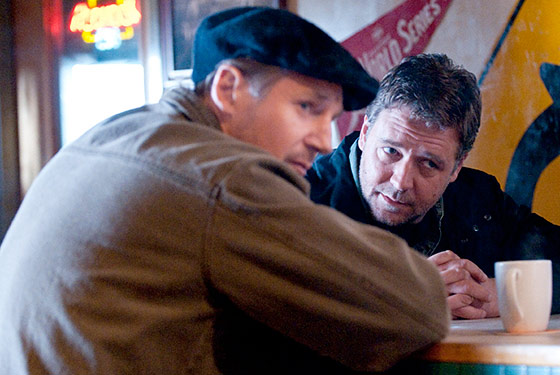
In Paul Haggis’s The Next Three Days, an edgy Pittsburgh businesswoman, Lara Brennan (Elizabeth Banks), gets hauled off for a murder she likely didn’t commit, and her husband, John (Russell Crowe), becomes obsessed with exonerating her. It’s not just that he believes in her innocence and that his pale little son is dissolving without Mommy. Something more is at stake, something he finally realizes in the middle of teaching a class on Don Quixote. (Yes, he’s a literature professor.) The book, he tells his students, is about how much of our life is out of our hands and what it means to take control. Although it might seem to others as if John is tilting at windmills — or impregnable penitentiaries — he will act to save his family if it kills him. And his wife. And his kid.
Scene by scene, The Next Three Days feels off. Haggis withholds key details, and he’s not a good enough storyteller to get away with being tricky: What he means to be ambiguous comes off as inept. When Banks’s Laura meets her husband, his brother, and his brother’s wife for dinner after a blowout with her boss, she’s in such a foul mood that she insults her sister-in-law’s cleavage, and they nearly come to blows. When, the next morning, she’s arrested in front of her wailing child for murder, we wonder whether that woman might be the victim: a cleavage-related killing? It’s a while before Haggis tells us who died (it’s not the sister-in-law), and even longer before we learn that Lara’s fingerprints were all over the weapon. Haggis wants us first to be outraged and then, gradually, to wonder if Lara might have done it after all. She certainly has the temper for it. Meanwhile, John is sharpening his lance to rescue fair Dulcinea.
The Next Three Days is based on a French thriller called Pour Elle, which I haven’t seen and which might be just as loopy. But the French have more practice pairing existentialism and car chases: They saw existential themes in a lot of American thrillers of the forties and fifties and then made their own, pointy-headed versions. It’s possible that in the hands of a French director, the universe’s mocking indifference is more palpable and more provocative, that the hero’s quixotic quest makes more internal sense.
Crowe is a chameleon actor, often a great one, but he doesn’t find the character here. He shambles around trying to look like a nice, schlubby guy and speaking in a voice that uncannily resembles John Goodman’s. He and Banks don’t fit together — but then, he rarely fits with other actors. The rest of the cast looks at sea, as if they’d been handed their scripts at the last minute and gave up trying to connect the dots. The exception is Liam Neeson as a Brooklyn ex-convict turned author who gives advice on jailbreaks: He is thoroughly preposterous and thoroughly entertaining. It would have been fascinating, though, to see him in Crowe’s part and vice versa. Neeson’s gravitas held the (French-produced) thriller Taken together. He might have given The Next Three Days a soul.
It should be said that Haggis works up a lot of suspense in the last half-hour, and I loved the new Moby song with the chorus, “I was the hell that she needed / ugh / I was the hell that she needed / ugh.” Haggis’s lack of control pays off in one respect: I was sure I knew where the movie was going, and then it went somewhere else. That somewhere is absurd, but I’ll give points to Haggis for doing the unexpected and taking on those windmills.


